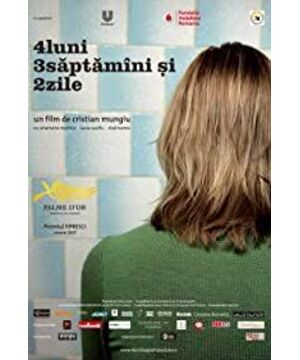In order to ensure the smooth flow of government orders, law enforcement officers have stationed in agencies, factories, rural areas, schools and various units according to Ceausescu's instructions to strictly monitor women and urge them to undergo monthly gynecological examinations to ensure that they are not using contraceptives; Women who use contraception and doctors who acquiesce in abortion will be severely punished and imprisoned if they are found out.
The story happened 21 years later in a university in Bucharest, the capital of Romania. In the first half hour of the film, we don’t even know what the heroine Otilia is doing: she seems to be doing something for Gabita, but it’s not clear; went to see her boyfriend and told him In the evening, he might not be able to attend his mother's birthday party; after turning around, he booked a room in the hotel. I wanted to book it for three days, but he was ashamed. Then I went to meet a man named Beibei. It wasn't until Otilia and Beibei came to the reserved guest room to sit down and have a conversation with Gabita, that we finally knew the ins and outs of the matter. What Otilia helped Gabita do is exactly the biggest taboo in the entire country: seeking medical abortion.
Money, sex and lies
For Gabita, the primary issue of abortion is not abortion itself, but money. In the final analysis, the reason why Gabita could not have a smooth abortion was actually that they did not have enough money to compensate for the risk of abortion for Mr. Bei Bei-if calculated by "April, three weeks and two days", it should be called murder. In fact, two female college students with very ordinary backgrounds seem to be short of money for reasons, but then we discovered that it is not just two college students who are short of money; Mr. Bei Bei is not rich either. Later, we discovered that these people seem to be more than short of money. After the 1980s, Ceausescu’s Luo Communist Party tried to reduce imports and expand exports in order to pay off its foreign debts. In fact, they offset the country’s agricultural and sideline products. This foreign debt was not paid off until 1989. In the movie, the director Christian Munge deliberately showed us such a scene: Mr. Bebe drove home before going with Otilia to the hotel, and he approached the door and found his old mother sitting at the door. . When asked why, the mother said that it was to queue up for the neighbors to buy sugar, but when she came back, she found that the door was blown shut. It can be seen that the lack of money and material and the lack of materials have become very serious problems affecting all strata of Romanian society at that time.
Finally, we have come to the starting point of the problem: Jiabita is short of money, and Mr. Beibei is also short of money-human nature is exposed in such an environment. People often refer to Beibei as a beast in the skin of a doctor, who likes to lash out at his evil deeds; but a very rational doctor is in such a situation where it is impossible to get material benefits anyway, except to a certain extent What are the options for getting some spiritual comfort? On the contrary, Otilia's deprivation should cast doubt on Gabita's people to a large extent: Why did she tell Beibei that Otilia is her sister? When a classmate recommended Mr. Beibei to her, didn't she know all the conditions well? Isn't she sacrificing Otilia's chastity for the small amount of money in her pocket?
Rather, under the social conditions at the time, the apparent value judgments of good and evil are no longer sufficient to describe people's tactics and true intentions in their hearts. Out of sympathy for the "vulnerable", we will severely condemn Mr. Beibei and have pity for Jiabita, but I am afraid that none of them can afford these comments. Only Otilia first sacrificed the time to attend her boyfriend’s mother’s birthday party, and then risked going to jail to help Gabita bring Mr. Beibe to the hotel, then lost her life for her roommate during her menstrual period, and then took the risk in the dark. Throwing the placenta out of the garbage station at the risk of being discovered. Whether it is from the sympathy of the same women or the friendship of living in the same room, Otilia undoubtedly shows the most brilliant, most maternal, and full of love in human nature. It seems that it has completely surpassed the ability of the society at that time. Carrying all the realistic values, although her love is often manifested under compelling circumstances.
Three kinds of people and a plate of meat
There are three kinds of people in the world—of course, I mean Romania at the time—men, women, and public officials. This classification is not intended to distinguish between their physical gaps, but to distinguish between their personalities and living conditions. From the conductor on the bus, the receptionist at the entrance of the classroom, to the female receptionist of the hotel, and the front desk manager who looks exactly like Ceausescu, the characteristics of all these people are not “bureaucratic” as some people call, but “professionalism”. change". Various regulations of various industries frame people in a range, which over time makes them lose their emotions and become professional vassals. They occupy important positions in the city, have stable jobs, and don't have to worry about being assigned to the countryside, so they are often "superior." Below them are the men who are physically dominant and the young women who are in an absolutely disadvantaged position. The two male characters that the director focused on in this film-Beibei and Otilia's boyfriends, are actually good men with gentle temperament and dedication to the family: Beibei can be said to be conscientious to the patients, when the doctor orders Speak softly; Eddie is also very nice to his girlfriend, and he feels full of love in his speech and manners. However, when Beibei faced Gabita and Otilia who had no money, and Eddie faced the question of what would happen to her girlfriend when she became pregnant, they both deviated from the direction of a good man. There is no doubt that it is a social system with no freedom and extreme injustice that stands on the opposite side of human nature. Just imagine, if there were no abortion regulations in Romania at that time, would Beibei do this kind of business? If Romania at that time did not stipulate that couples must have four children after they got married, would Eddie still be so eloquent in front of his girlfriend on the issue of responsibility? Maybe the possibility will be greatly reduced.
The opposite of human nature is the system. This interpretation is likely to be "the ugly defense of ugly men" and "deliberately politicizing the film." So let's go back to the night when Otilia is holding Jiabita's child on two days of April, three weeks and two days, walking quickly on the dark path. The thing in her hand that was still gestating a life not long ago made Otilia terrified; if it is not handled well, she, along with her roommate and doctor, will be thrown into jail for at least ten years. And along with this double fear, there was also a tall and mighty man who couldn't get rid of it at night. All of these can undoubtedly be deeply embedded in her memory and constitute the most terrifying night in Otilia's life. In the end, she climbed up to an apartment and threw the tightly wrapped placenta into the vertical trash channel without being prepared.
There was a terrible ding-ding, followed by a muffled sound, and this thing finally landed. Otilia returned to the hotel, but unexpectedly discovered that Gabita was not in the guest room. After searching several times, she found that she was preparing to eat in the restaurant. Otilia saw that the waiter brought a plate of beef, pork chops, liver and bone marrow from the opposite wedding banquet. The two stared at the plate and remained silent for a long time. Surprised by scarcity? Surprised by the flesh? The film stopped here abruptly. Compared with these eyes and emotions, it is more worthy of our consideration. As some comments mentioned, "Isn't the prohibition of abortion not humanitarian?" Why is Jiabita's boyfriend so determined to break up with her? What role did she and her boyfriend, who did not appear, play in the entire abortion?
In 2007, "April Three Weeks and Two Days" won the Palme d'Or without any suspense. The extremely calm and long shots, the narrative of the flowing water, the precise composition, the creation of suspense, and the profound exposure of social issues and human nature, all of these have made this film the pinnacle of the Romanian New Wave. Thinking about it now, whether it was the pain when Babe made probes for Gabita, or the tension and anxiety of Otilia when she was sitting around a table with everyone at her boyfriend’s house, I still remember it, and it can be seen that the film has brought it in. The feeling is strong, and as Christian Mungi’s second feature film, "April Three Weeks and Two Days" is just the beginning.
View more about 4 Months, 3 Weeks and 2 Days reviews









